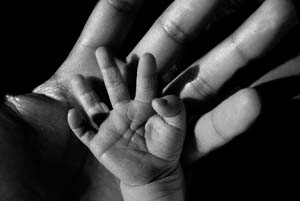Pregnancy Warning Signs
It can be difficult to know when you should be concerned about a sudden ache or pain and that is what our pregnancy warning signs are here to help you with
. How do you work out whether you’ve simply pulled a muscle or whether that pain is a sign of preterm labor? If you are at all unsure it is always better to be cautious and contact your doctor or midwife just to be on the safe side.

We’ve listed a number of symptoms here that always require urgent attention.
The Common Warning Signs
• Severe or persistent pain or tenderness in the abdominal region.
• Vaginal bleeding or spotting.
• Increased vaginal discharge or a change in the type of discharge. Seek medical advice if it becomes watery, mucousy, or bloody (even if it's only pink or blood-tinged). After 37 weeks, however, an increased mucus discharge is normal and may be a sign that labor is imminent.
• Pelvic pressure (feeling as though your baby is pushing down), pain in lower back (particularly if this is a new problem for you), period-like cramping or abdominal pain, or more than four contractions in an hour (even if they don't hurt) before 37 weeks gestation.
• Painful, burning, or a decrease in urination.
• Severe or persistent vomiting or any vomiting experienced with pain or fever.
• Chills or high temperature of 100 degrees Fahrenheit or higher is a major one of the pregnancy warning signs..
• Any visual disturbance such as double vision, blurring, dimming, flashing lights, or "floaters" (spots in your field of vision).
• Persistent or severe headache or headache together with blurred vision, slurred speech, or numbness.
• Swelling or puffiness on your face or around your eyes, acute and rapid development of swelling in your feet or ankles, or rapid weight gain (more than 4 pounds in a week).
• A persistent or severe leg cramp or calf pain that isn’t eased by flexing your ankle, or one leg swelling more than the other.
More Pregnancy Warning Signs
• Abdominal trauma.
• Any fainting, recurrent dizziness, rapid heartbeat, or heart palpitations.
• Experiencing difficulty breathing, coughing up blood, or chest pain.
• Severe constipation along with abdominal pain or severe diarrhea lasting over 24 hours.
• Relentless intense itching of the torso, arms, legs, palms, or soles, or feeling itchy all over your body.
• Any health problems that you'd normally contact your practitioner about even if it’s not linked to your pregnancy (for example asthma or a cold that worsens rather than improves). Contact your practitioner earlier than you normally would and consider it one of the pregnancy warning signs.
Even if you’re not sure whether your symptoms are serious, it is always safer to contact your healthcare provider. They expect to receive these calls and if there’s nothing wrong they will be able to reassure you.
The changes in your body happen so quickly that it’s difficult to know what’s normal and what you should be concerned about. Look out for yourself and your baby and get yourself checked out.
When you’re finally approaching your due date, make sure you know about the signs of labor so that you can provide your caregiver as much information as possible when you make that call.
Return from pregnancy warning signs to A 3D Ultrasound
Site Contents
Pregnancy
- Getting Pregnant Tips
- Signs of Being Pregnant
- Pregnancy Warning Signs
- 3 Stages of Labor
- Good Sleeping and Pregnancy
- Sleep Hygiene and Tips
- Top 10 Pregnancy Questions
- Advantages of Natural Childbirth
- Why An Early Pregnancy Ultrasound?
- Why A Late Pregnancy Ultrasound?
- Gender Ultrasound Overview
3D Ultrasound
- What is a 3D Ultrasound?
- What's the Procedure Like?
- Reasons for 3D Ultrasounds
- Ultrasound Technology
- When & Why: Diagnostic Ultrasound
- Is a Prenatal Ultrasound Risky?
- Ultrasound Machine Risks / Safety
- Scheduling Your 3D Sonogram
- Preparing for 3D Baby Ultrasound
- Ultrasounds FAQ